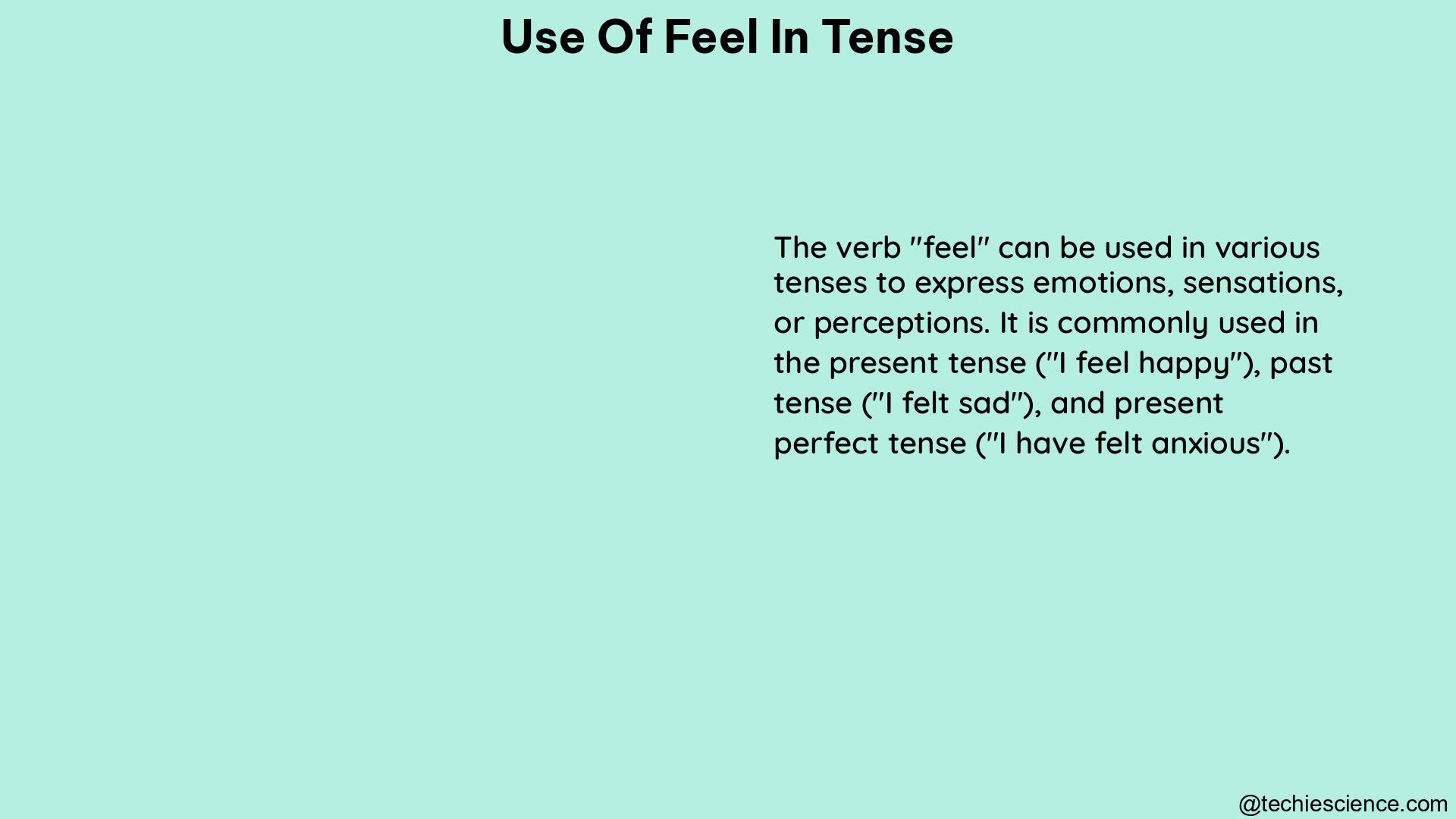The use of the verb “feel” in English can be a bit tricky, as it involves both regular and irregular forms across various tenses. This comprehensive guide will delve into the nuances of using “feel” in the present, past, future, and perfect tenses, providing you with a thorough understanding of this versatile verb.
Present Tense
Simple Present
In the simple present tense, the conjugation of “feel” follows the standard subject-verb agreement:
- I feel
- You feel
- He/She/It feels
- We feel
- They feel
For example, “I feel happy today,” or “The weather feels warm outside.”
Present Continuous
The present continuous tense of “feel” is formed by using the present tense of the verb “to be” (am, are, is) followed by the present participle of “feel” (feeling):
- I am feeling
- You are feeling
- He/She/It is feeling
- We are feeling
- They are feeling
For instance, “I am feeling a bit under the weather today,” or “The team is feeling confident about the upcoming game.”
Past Tense

Simple Past
The simple past tense of “feel” is an irregular form, where the verb changes to “felt” regardless of the subject:
- I felt
- You felt
- He/She/It felt
- We felt
- They felt
For example, “I felt nervous before the presentation,” or “The family felt excited about the surprise party.”
Past Continuous
The past continuous tense of “feel” is formed by using the past tense of the verb “to be” (was, were) followed by the present participle of “feel” (feeling):
- I was feeling
- You were feeling
- He/She/It was feeling
- We were feeling
- They were feeling
For instance, “I was feeling a bit under the weather during the trip,” or “The team was feeling the pressure as the game progressed.”
Future Tense
Simple Future
The simple future tense of “feel” is formed by using the auxiliary verb “will” followed by the base form of the verb:
- I will feel
- You will feel
- He/She/It will feel
- We will feel
- They will feel
For example, “I will feel much better after a good night’s sleep,” or “The company will feel the impact of the new regulations.”
Perfect Tenses
Present Perfect
The present perfect tense of “feel” is formed by using the present tense of the verb “to have” (have, has) followed by the past participle of “feel” (felt):
- I have felt
- You have felt
- He/She/It has felt
- We have felt
- They have felt
For instance, “I have felt a sense of relief since completing the project,” or “The team has felt the effects of the recent changes in the industry.”
Present Perfect Continuous
The present perfect continuous tense of “feel” is formed by using the present perfect tense of the verb “to be” (have/has been) followed by the present participle of “feel” (feeling):
- I have been feeling
- You have been feeling
- He/She/It has been feeling
- We have been feeling
- They have been feeling
For example, “I have been feeling a bit under the weather for the past few days,” or “The company has been feeling the impact of the economic downturn.”
Past Perfect
The past perfect tense of “feel” is formed by using the past tense of the verb “to have” (had) followed by the past participle of “feel” (felt):
- I had felt
- You had felt
- He/She/It had felt
- We had felt
- They had felt
For instance, “I had felt a sense of unease about the decision before it was made,” or “The team had felt the pressure of the competition before the final match.”
Past Perfect Continuous
The past perfect continuous tense of “feel” is formed by using the past perfect tense of the verb “to be” (had been) followed by the present participle of “feel” (feeling):
- I had been feeling
- You had been feeling
- He/She/It had been feeling
- We had been feeling
- They had been feeling
For example, “I had been feeling a bit under the weather for a few days before the trip,” or “The company had been feeling the effects of the economic downturn for several quarters.”
Future Perfect
The future perfect tense of “feel” is formed by using the future tense of the verb “to have” (will have) followed by the past participle of “feel” (felt):
- I will have felt
- You will have felt
- He/She/It will have felt
- We will have felt
- They will have felt
For instance, “By the end of the year, I will have felt the full impact of the changes in my life,” or “The team will have felt the pressure of the competition by the time the final match arrives.”
Examples
- Simple Past: “The family felt very happy to be going on holiday together.”
- Present Perfect Continuous: “I just look tired because I have been feeling a little sick for the last week.”
- Past Perfect: “I felt that I had no past or future.”
Key Points
- “Feel” is an irregular verb, meaning it does not follow the usual -d, -ed, or -ied endings in the past tense.
- The past tense of “feel” is “felt”.
- The continuous form of “feel” can be used, but it is often replaced with the simple form in certain contexts.
References
- https://www.wordreference.com/conj/enverbs.aspx?v=feel
- https://www.grammarwiz.com/past-tense-of-feel.html
- https://forum.wordreference.com/threads/feel-in-continuous-form.1931316/
- https://english.stackexchange.com/questions/270269/felt-present-past-back-shifting
- https://www.curso-ingles.com/en/resources/conjugator/feel

Hi…. I am Goutam Datta. I have completed a double M. A. in English and B. Ed. I am a creative writer. Currently, I am a part of the LambdaGeeks.